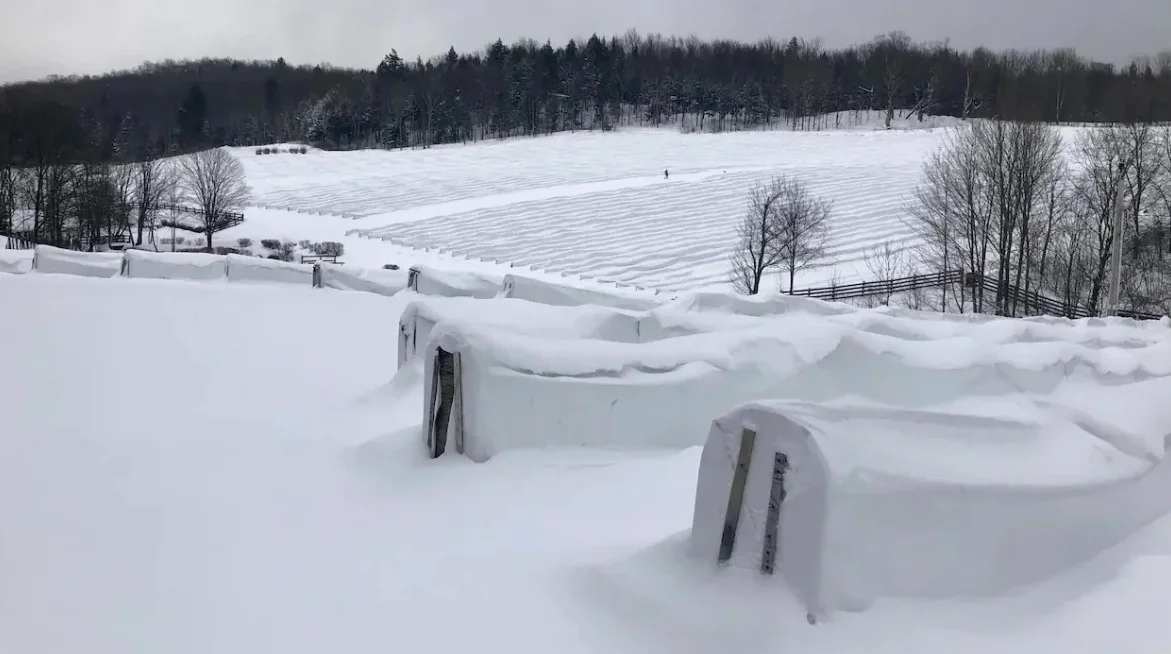
Geothermal energy keeps grape vines cozy in winter at Eastern Townships vineyard
At the Vignoble du Ruisseau in Dunham, in Quebec's Eastern Townships, rows of grape vines are taking their long winter's nap under cocoons of insulating geotextile, covered with a layer of snow.
But these vines are benefitting from an extra source of heat to keep them comfortable during Quebec's harsh winter freeze: geothermal energy.
The family that owns the vineyard believes it's the first in the world to use the technology to protect grape vines from the cold.
"The thinking here is, go big or go home," said Sara Gaston, general director of the Vignoble du Ruisseau.
The system, patented by the vineyard, distributes heat across 7.5 hectares of fields, thanks to 15 kilometres of tubing running both above and below ground, keeping the temperature of the soil above –10 C all year round.
In addition, the vineyard's warehouses, vats and cellars are all heated and cooled using geothermal energy.
"Two metres below ground, it stays between 5 and 8 degrees, in summer or in winter," said Gaston. "Whether you're in Hawaii or in France, it's about the same temperature."

The Vignoble du Ruisseau's geothermal heating system protects vines during the winter using a series of tubes that displace heat from a few metres underground to the surface, using the flow of liquid. (CBC/Matt D'Amours)
The system works by carrying that underground heat to the surface with the help of a glycol solution flowing through the tubes.
Gaston says, in winter, that redirected heat protects sensitive buds and helps limit losses of grapes in intense cold snaps.
"We wanted to make sure that the vines don't die and that there is a full and quality harvest, year after year," she said. "That allows us to have vines that are more than ten years old…that are imbued with the terroir of our region."
She says the idea to use geothermal heating was born of the family's desire to plant grape varieties such as Cabernet Sauvignon, Merlot and Riesling, which tend to prefer the warmer climates of France's Burgundy & Alsace regions.
"Those types of vines resist until -18 [degrees]," she said. "So that's why we have to heat them to be sure that when we have minus 30…the vine will be ok."
They landed on geothermal as an eco-friendly option and developed their own system to harness it. On particularly cold days, Gaston says the vineyard generates additional heat from electricity or wood chips.
While the system is mostly used in winter, she says the vineyard also uses geothermal heat to "wake up" the vines a few weeks earlier in the spring, to give the grapes a longer growing season.

Sara Gaston, general director of the Vignoble du Ruisseau in Dunham, Que., says the vineyard's geothermal system allows it to protect sensitive buds and limit losses of grapes in intense cold snaps. (CBC/Matt D'Amours)
'A NOVEL IDEA'
While other vineyards and agricultural projects have adopted geothermal systems to heat buildings, using geothermal energy to directly warm the ground to protect plants is "a novel idea" according to Fuzhan Nasiri, PhD in environmental systems engineering, and an associate professor at Concordia University.
Nasiri said systems like the one used at the vineyard are considered shallow systems, because they rely on the differences of temperature between the surface and a few metres underground to act as a source of heat in winter or a heat sink in summer.
Shallow geothermal is ideal for farmland, Nasiri said, because over a large area the energy "can be continuously exploited from several points underneath the earth's surface."
In contrast, deep geothermal systems rely on vertical wells, or boreholes, that range from 500 metres to several kilometres in depth, and can produce heat to generate enough steam to run a power plant.
Nasiri said while Quebec's geological and soil characteristics generally make deep geothermal systems too costly, there is "great potential" for more shallow geothermal projects in the province.
He said that after the initial investment, the systems could "provide a continuous renewable and clean source of heat which is almost free" and if used to heat entire buildings, could "shave a considerable amount of load on our grids."
"One major opportunity exists in [the] use of geothermal for district heating systems for neighbourhoods in cities or for remote communities in Quebec, which are off-grid and rely solely on diesel," Nasiri said in an email.
The geothermal model used at Vignoble du Ruisseau is one the vineyard developed itself and one that Gaston says she is willing to share with other producers, as they refine the technical specifications of the system.
"Eventually we want to export this technology, whether it's to our neighbours in Ontario, outside of Quebec or even outside of Canada," she said.
With files from Matt D'Amours, Fenn Mayes, Radio-Canada
This article was originally published for CBC News.
